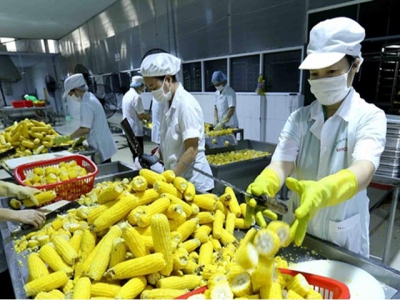Việt Nam needs to invest in processing, packaging of agricultural products - experts

Ho Chi Minh City — Fruit and vegetable exporters should improve their processing technologies, especially in the post-harvest and packaging stages, to preserve their products longer and enhance their value, experts said.
A fruit processing plant in the Cửu Long (Mekong) Delta. — VNA/VNS Photo
Statistics from the Ministry of Agriculture and Rural Development show that the value of fruit and vegetable exports in the first quarter were worth US$950 million, a 6.1 per cent rise year-on-year.
Due to the impact of COVID-19, last year exports fell marginally to $3.26 billion.
According to Đặng Phúc Nguyên, general secretary of the Việt Nam Vegetables Association, new-generation free trade agreements (FTAs) such as the EU-Việt Nam Free Trade Agreement (EVFTA), the Comprehensive and Progressive Agreement for Trans-Pacific Partnership (CPTPP) and Regional Comprehensive Economic Partnership (RCEP) are helping Vietnamese businesses increase fruit and vegetable exports this year.
The UK – Việt Nam Free Trade Agreement (UKFTA) effected late last year made more than 94 per cent of vegetables and fruits be exported tax-free, he said.
Many key products such as litchi, longan, rambutan, dragon fruit, and pineapple would benefit since tropical fruits originating from competing countries such as Brazil, Thailand and Malaysia do not have FTAs with the UK, he said.
Experts said to take advantage of opportunities and boost exports, businesses would need to improve the quality of their fruit and vegetable products to meet the standards required by importing markets.
Nguyễn Quốc Toản, director general of the General Department for Agricultural Products Processing and Market Development, said post-harvest losses accounted for 10 per cent of rice output, 10-20 per cent of root and tuber crops and 10-30 per cent of fruits and vegetables.
In the Mekong Delta, Việt Nam’s rice bowl, post-harvest losses were worth more than VNĐ3 trillion ($132 million) a year, he said.
The country’s preservation methods were basic and outdated, its transport, storage and cold storage were of poor quality, and there were very few deeply processed products, he said.
Packaging farm products also plays a very important role in preserving them after harvest, but Vietnamese businesses do not pay attention to that, according to experts.
Some 70 per cent of fruit and vegetable exports is to neighbouring China, mostly in fresh and unprocessed forms.
Little goes to South Korea, Japan, the US, or the EU because of storage and post-harvest processing limitations.
Có thể bạn quan tâm
 Mango exports - Cambodia has become Vietnam’s rival in the Chinese market
Mango exports - Cambodia has become Vietnam’s rival in the Chinese market Cambodia has obtained the go-ahead to export mangoes to China, becoming a new rival for Vietnam in the 1.4 billion consumer market.
 Vietnam to buy out IP rights for ST25 rice variety
Vietnam to buy out IP rights for ST25 rice variety ST24 and ST25 rice varieties are expected to become state assets, ensuring mass production in Vietnam.
 Hải Dương prepares to introduce Thiều lychee on e-commerce platforms
Hải Dương prepares to introduce Thiều lychee on e-commerce platforms Authorities of the northern province of Hải Dương are carrying out necessary procedures to offer from 5-10 products meeting standards